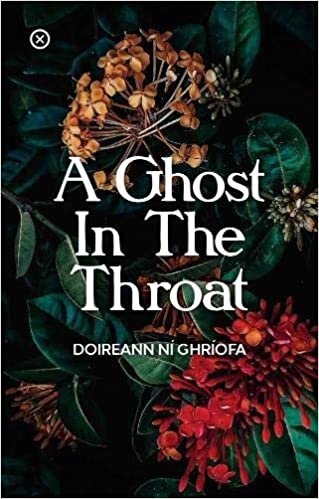Republic of Consciousness Class of 2021: A Ghost in the Throat by Doireann Ní Ghríofa (Tramp Press)
Between March 8th and March 19th we will be posting ten pieces on our blog celebrating the Republic of Consciousness Prize 2021 longlist. There will be interviews, extracts and articles, with each piece focussing on a longlisted book.
Today we have an extract from A Ghost in the Throat by Doireann Ní Ghríofa (Tramp Press). Highly acclaimed, A Ghost in the Throat has been longlisted for the 2021 Rathbones Folio Prize in addition to the Republic of Consciousness.
When we first met, I was a child, and she had been dead for centuries.
Look: here, I am eleven, a girl who is terrible at sums and at sports, a girl given to staring out windows, a girl whose only real gift lies in daydreaming. The teacher snaps my name, startling me back to the flimsy prefab. Her voice makes it a fine day in 1773, and sets English soldiers crouching in ambush. I add ditch-water to drench their knees. Their muskets point towards a young man who is tumbling from his saddle now, in slow, slow motion. A woman rides in to kneel over him, her voice rising in an antique formula of breath and syllable the teacher calls a ‘caoineadh’, a keen to lament the dead. Her voice generates an echo strong enough to reach a girl in the distance with dark hair and bitten nails. Me. In the classroom, we are presented with an image of this woman standing alone, a convenient breeze setting her as a windswept, rosy-cheeked colleen. This, we are told, is Eibhlín Dubh Ní Chonaill, among the last noblewomen of the old Irish order. Her story seems sad, yes, but also a little dull. Schoolwork. Boring.
By the time I find her again, I only half-remember our first meeting. As a teenager I develop a schoolgirl crush on this caoineadh, swooning over the tragic romance embedded in its lines. When Eibhlín Dubh describes falling in love at first sight and abandoning her family to marry a stranger, I love her for it, just as every teenage girl loves the story of running away forever. When she finds her murdered lover and drinks handfuls of his blood, I scribble pierced hearts in the margin.
***
Years passed before the poem found me again, moving house while pregnant with two small children in tow, my elbow straining to change gear, wedged between our old TV and a bin-bag of teddies, my voice leading a chorus through ‘five little ducks went swimming one day’. I was driving along unfamiliar roads, ‘over the hills and far away’, scanning signs for Bishopstown and Bandon, for Macroom and Blarney, while singing ‘Mammy Duck said Quack, Quack, Quack …’ when my eye tripped over a sign for Kilcrea.
Kilcrea – Kilcrea – the word repeated in my mind as I unlocked a new door, it repeated and repeated as I scoured dirt from the tiles, and grimaced at the biography of old blood and semen stains on the mattresses. Kilcrea, Kilcrea, the word vexed me for days, as I unpacked books and coats and baby monitors, spoons and towels and tangled phone chargers, until finally, I remembered – Yes! – in that old poem from school, wasn’t Kilcrea the name of the graveyard where the poet buried her lover? I looked towards the hills in the distance, and then turned to rummage for my phone.
I found the poem online, surprised that there were many more verses to the Caoineadh than I recalled, thirty, or more. It began with Eibhlín Dubh watching a man stroll across a market. His name was Art and, as he walked, she wanted him. They eloped and led a life that could only be described as opulent: oh, the lavish bedchambers, oh, the delectable meals, oh, the couture, oh, the long, long mornings of sleep in sumptuous duck-down. As Art’s wife, she wanted for nothing. I was still thinking about it as I knelt to scrub our filthy rented toilet. I envied her, and wondered how many servants it took to keep it all going, how many shadow-women doing their shadow-work, the kind of shadow-women I come from.
That night, the baby squirmed inside me until I abandoned sleep, scrambling for my phone instead. My husband instinctively curled his sleeping body into mine; despite his snores, I felt him grow hard against the dip of my back. I frowned, holding very still until I was sure he was asleep, then inching away to whisper the poem to myself, conjuring a voice through hundreds of years, from her pregnant body to mine. As everyone else dreamed, my eyes were open in the dark.
You can buy A Ghost in the Throat from Tramp Press’s website here.

